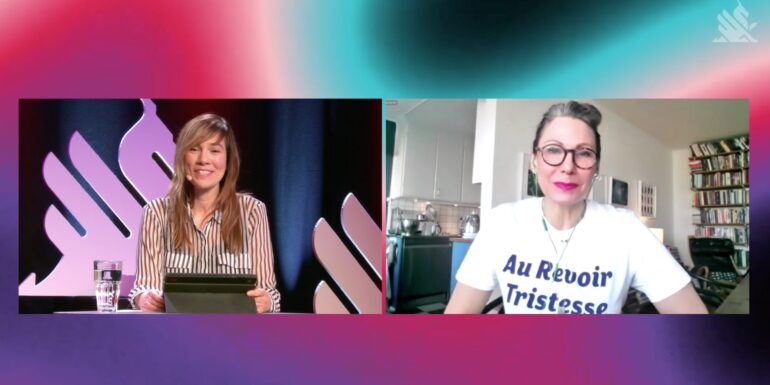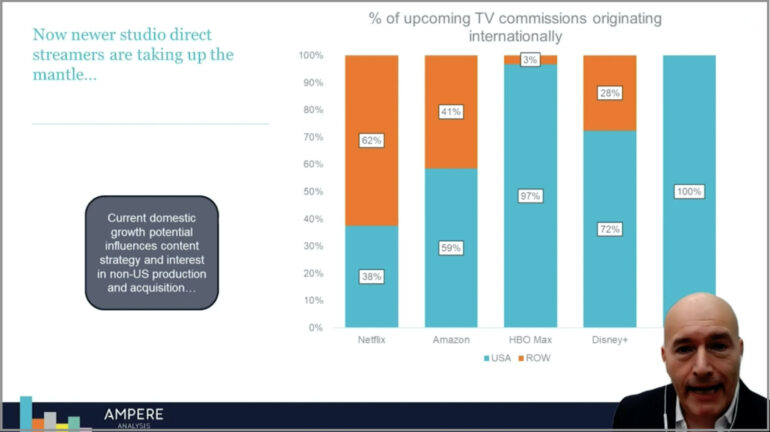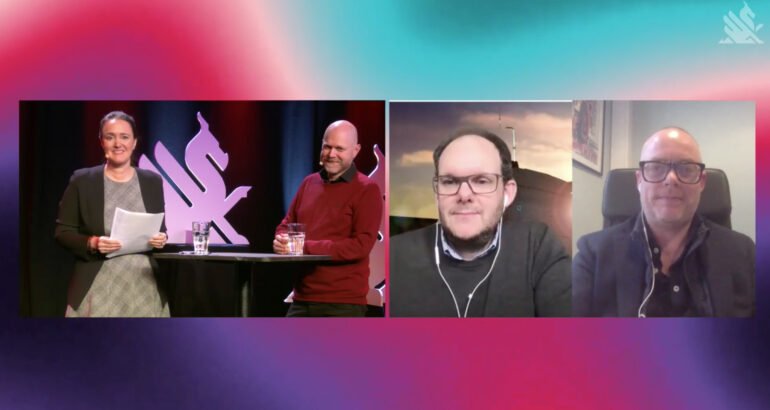WRITTEN BY: Annika Pham
Keynote speakers, data from Ampere Analysis and Nostradamus Report gave a hopeful overview of the European drama market.
For its first virtual event, attended by a record 500+ global delegates, the two-day TV Drama Vision in Göteborg under the helm of Cia Edström, closed yesterday, with messages of hope, despite the global pandemic.
The event was conducted like a live Eurovision transmission, hosted mostly by new moderator Marike Muselears (Lumiere Group CEO in a new stint), as well as Johanna Koljonen, Camilla Larsson, Wendy Mitchell.
The Visions of the future in the European drama industry was captured by the various keynote speakers, as well as Koljonen’s coveted Nostradamus report, and data specialist Guy Bisson from Ampere Analysis.
According to Bisson, the pandemic has accelerated the structural changes already underway on the market, with the collapse of windows, and wars between direct to consumer (DTC) streamers continuing to disrupt the drama eco-system.
The value of global content has more than doubled between 2005 to 2020 - from $330 billion to $700 billion, while the power has shifted on the TV side (pay TV up from 32% to 47% during that period and free TV up from 47% to 48%), to the detriment of the theatrical (down from 6% in 2005 to 2% in 2020) and home entertainment (down from 14% to 3%).
The 100-old-system of physical distribution is no longer driven by competitive advantage, as US studios are retaining rights to feed their DTC platforms and closing the tap to content traditionally available to international distributors. “They are now bypassing the middlemen, aggregators, and going direct”, stressed Bisson.
In this new DTC streaming paradigm, commissioning of original production is booming, and around 803 shows are currently in development globally, of which 80% are scripted.
The top genres are sci-fi/fantasy (20%), followed by comedy (19%), crime/thriller (16%), drama (14%), family and kids (11%) and documentaries (10%) among others.
According to Bisson, Netflix has been a driving force in content globalisation, with non-US originated titles representing 62% of its upcoming originals.
That said, the new heavyweight players (Disney +, Peacock, Paramount+, HBO Max) are “taking up the mantle”, ready to invest more in local content.
Upcoming commissioning content from the new OTT players is split accordingly: Netflix 38% US, 62% international; Amazon 59% US, 41% international; HBO Max international 97%, US 3% and then Disney+ 72% US, 28% International which means that growth potential for originals across the globe is paramount.
While streamers were still commissioning avidly during the pandemic (+11% commissioning Q2 2020 and 73% Q4), linear commissioners have been slower at responding to the challenges (-31% new shows Q2 2020 and -4% Q4 2020).
In terms of content, global streamers favour diverse stories (Netflix, HBO Max, Amazon), local footprint, Disney+ its own franchise characters, Peacock diversity and gender issues. According to Ampere, one in four scripted projects is based on existing content, but the source is changing, still driven by books, but more skewed towards a young generation, with comics, Manga, podcasts and games.
For Bisson, the surge in commissioning will be sustained, at least the next three years. “For creators this is fantastic news, as negotiation of rights is also improving,” he said.
Meanwhile, as pointed out by Koljonen in her Nostradamus Report, the theatrical experience is not dying, but changing. The future of cinema will be one of “an upmarket offer”.
NORDICS FIGHTING BACK
Against the rise of new mega-streamers entering the market in 2021 and beyond, how is the European and Nordic industry preparing for the battle of rights ownership and content creation to woo audiences?
On an industry standpoint, reinforcing co-productions and collaborations between public broadcasters, even on a European level, were some of the suggestions that came out of the two-day TV event. “I think an alliance between broadcasters, healthy soft money, tax rebates would help. A super alliance In the EU outside the Nordics would be great,” said Anna Croneman, Head of Drama at SVT.
DR Head of Drama’s Christian Rank said traditional broadcasters have to adapt and reinvent themselves in the digital world. “It’s very challenging. We have to collaborate locally to stay strong,” he noted, citing a necessary unholy alliance with Netflix on Borgen 4, that allowed him “to keep his editorial profile on other shows.”
Stronger co-productions with EU partners such as Spain’s Mediapro or Moviestar+ (invited as part of a Focus on Spanish Drama), who expressed strong wishes to collaborate with the Nordics, were other options, although Covid-19 is temporarily reducing such ambitions.
Exploring new artistic venues thanks to new technology, such as virtual production - booming under covid-times - was another interesting idea, introduced by producers Kjartan Thor Thordarson from Iceland (Sagafilm) and Stockholm-based Patrick Nebout and Henrik Jansson-Schweizer (Dramacorp).
Offering better contract conditions for talents and creators, protecting and sharing rights with them, was illustrated by the ‘new kid in town’ Copenhagen-based True Content Entertainment.
Creating meaningful content, socio-politically relevant, anchored in local history, about shared values (‘folkelighed’) is another winning recipe already followed successfully by Nordic pubcasters.
But one overruling point, reiterated by various keynote speakers in Göteborg and underlined in the Nostradamus report, is the need to reform storytelling by luring younger viewers aged 18-25, without losing the traditional ageing audience.
Ultimately, in today’s booming drama market that is compensating for the decline in theatrical revenues, maintaining innovation, and avoiding complacency were other key recommendations from Walter Iuzzolino (CEO Eagle Eye Drama and founder of the curated Walter Presents streaming service) and the Nostradamus report.
TO READ THE FULL NOSTRADAMUS REPORT: CLICK HERE.
The Nostradamus report is supported by Nordisk Film & TV Fond.


